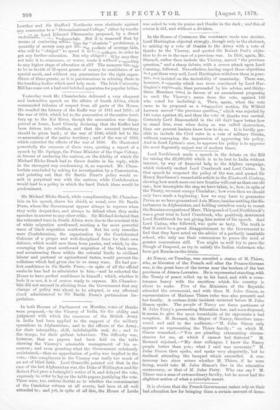At Nancy, on Tuesday, was unveiled a statue of M.
Thiers, who, as liberator of the French soil after the Franco-German war, is the great hero of the towns near the borders of the lost provinces of Alsace-Lorraine. He is represented standing, with the Treaty of peace rolled up in his hand, and with a coun- tenance heavy with the sacrifices which his country ia about to make. Five of the Ministers of the Republic attended the ceremonial, and with them M. Jules Simon, as representative of Madame Thiers (who was also present) and her family. A curious little' incident occurred before M. Jules Simon spoke. The people of Nancy are fierce partisans of M. Jules Ferry's persecuting Education law, and were disposed, it seems, to give the most formidable of its opponents a bad reception. M. Bernard, the Mayor of Nancy, therefore inter- vened, and said to the audience,—" M. Jules Simon only appears as representing the Thiers family ; " on which M. Simon remarked,—" You are pleading extenuating circum- stances for me, at which I cannot feel flattered." M. Bernard rejoined,—"My dear colleague, I know the Nancy people better than you ; what I said was necessary." M. Jules Simon then spoke, and spoke very eloquently, but he declined attending the banquet which succeeded. A con- troversy has since arisen whether M. Thiers, if he were living, would take M. Jules Simon's line in the education controversy, or that of' M. Jules Ferry. Who can say ? M. Thiers was a man of extraordinary faculty, but he never had the slightest notion of what a principle meant.


































 Previous page
Previous page